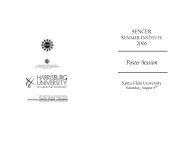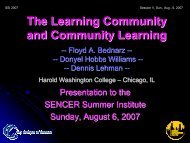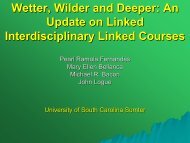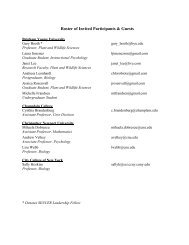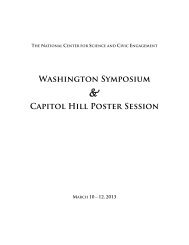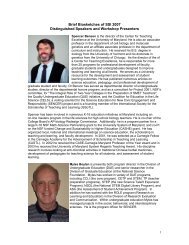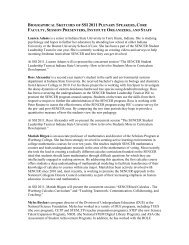Biosketches of invited speakers, Institute facilitators, and ... - SENCER
Biosketches of invited speakers, Institute facilitators, and ... - SENCER
Biosketches of invited speakers, Institute facilitators, and ... - SENCER
You also want an ePaper? Increase the reach of your titles
YUMPU automatically turns print PDFs into web optimized ePapers that Google loves.
Joseph Liddicoat is an adjunct pr<strong>of</strong>essor <strong>of</strong> science at New York University (NYU) <strong>and</strong> City College <strong>of</strong><br />
New York (CCNY) where he has taught several liberal arts courses for more than 20 years. He is retired<br />
from the department <strong>of</strong> environmental science at Columbia University’s Barnard College. His graduate<br />
education is in earth science <strong>and</strong> geophysics from Dartmouth College <strong>and</strong> the University <strong>of</strong> California,<br />
Santa Cruz. Joe’s published research is about Earth’s past magnetic field (paleomagnetism), tectonics,<br />
paleoclimate, paleontology, <strong>and</strong> heat flow.<br />
At Barnard, NYU, <strong>and</strong> CCNY, Joe has been part <strong>of</strong> the development <strong>and</strong> teaching <strong>of</strong> several courses that<br />
embrace <strong>SENCER</strong> ideals <strong>and</strong> philosophy. One <strong>of</strong> the Barnard courses he has worked on with Peter Bower<br />
<strong>and</strong> the Center for New Teaching <strong>and</strong> Learning at Columbia University is the <strong>SENCER</strong> Model<br />
Brownfield Action, the topic <strong>of</strong> a concurrent session at SSI 2010. The session will center on the<br />
experiences Joe <strong>and</strong> others have had teaching Brownfield Action to high school students in NYC from<br />
Harlem, Brooklyn, Queens, <strong>and</strong> the Bronx, <strong>and</strong> to other students at an independent high school in<br />
Manhattan. At NYU, the courses that have been proposed <strong>and</strong> taught following attendance at the<br />
<strong>SENCER</strong> Summer <strong>Institute</strong>s since 2004 are Global Ecology, Environmental Restoration, Ecological<br />
Restoration, <strong>and</strong> Carbon’s Corner in the Global Climate Challenge, which is the topic <strong>of</strong> Joe’s poster at<br />
the SSI 2010. At CCNY, the <strong>SENCER</strong> course is New York Harbor, which was described in a poster Joe<br />
presented at the SSI 2009 in Chicago. Joe was chosen as a <strong>SENCER</strong> Leadership Fellow in 2008, <strong>and</strong> he is<br />
part <strong>of</strong> two post-<strong>Institute</strong> Implementation Award teams, one that he leads at NYU <strong>and</strong> another at Kansas<br />
State University that is led by Saugata Datta.<br />
At SSI 2010, Joe will present a session on “The <strong>SENCER</strong> Brownfield Action National Model in New<br />
Applications: Instructing NYC High School Students in Environmental Science.” He is also the author <strong>of</strong><br />
the poster “Carbon’s Corner in the Global Climate Challenge” <strong>and</strong> the co-author <strong>of</strong> the poster “Using the<br />
<strong>SENCER</strong> Model Brownfield Action in Undergraduate Environmental <strong>and</strong> Geological Course Curricula.”<br />
Cynthia Maguire is a lecturer II for general science <strong>and</strong> chemistry at Texas Woman’s University (TWU)<br />
in Denton, Texas. She received her bachelor’s <strong>of</strong> science in biology <strong>and</strong> her master’s <strong>of</strong> science in<br />
chemistry from TWU. Cynthia strives to improve science comprehension among non-science majors by<br />
helping her students tackle their fear <strong>of</strong> science <strong>and</strong> get excited about learning. Cynthia established the<br />
first general science <strong>SENCER</strong> course at TWU, Environmental Chemistry: Global Perspectives, in the fall<br />
<strong>of</strong> 2007. The course examines chemical principles in the context <strong>of</strong> significant environmental issues such<br />
as sustainable energy, the ozone layer, adequate water quality/quantity, <strong>and</strong> acid rain. Through abundant<br />
field experience, students learn to assess environmental risk, collect surface water samples for analysis,<br />
<strong>and</strong> explore impacts <strong>of</strong> human development on nearby natural areas. Each semester, Cynthia shares her<br />
passion for science education <strong>and</strong> environmental water monitoring as her students become certified water<br />
quality monitors for the Texas Stream Team. Cynthia was recently chosen as the president-elect <strong>of</strong> the<br />
Native Plant Society <strong>of</strong> Texas (NPSOT). She will serve as the president <strong>of</strong> the organization in 2011. Her<br />
responsibilities involve the organization the society’s annual meeting, which will take place October 7-10<br />
on TWU’s Denton campus. Cynthia hopes the October symposium will educate the public <strong>and</strong> show<br />
participants how to practice sustainable l<strong>and</strong>scaping on their property <strong>and</strong> in their communities. The<br />
mission <strong>of</strong> NPSOT is to promote the conservation, research <strong>and</strong> utilization <strong>of</strong> the native plants <strong>and</strong> plant<br />
habitats <strong>of</strong> Texas.<br />
At SSI 2010, Cynthia will co-present the concurrent session “Field Report: Disaster, Drought,<br />
Development, <strong>and</strong> Degradation—Three Innovative Courses from SCI Southwest” <strong>and</strong> a poster on the<br />
same subject.<br />
61



